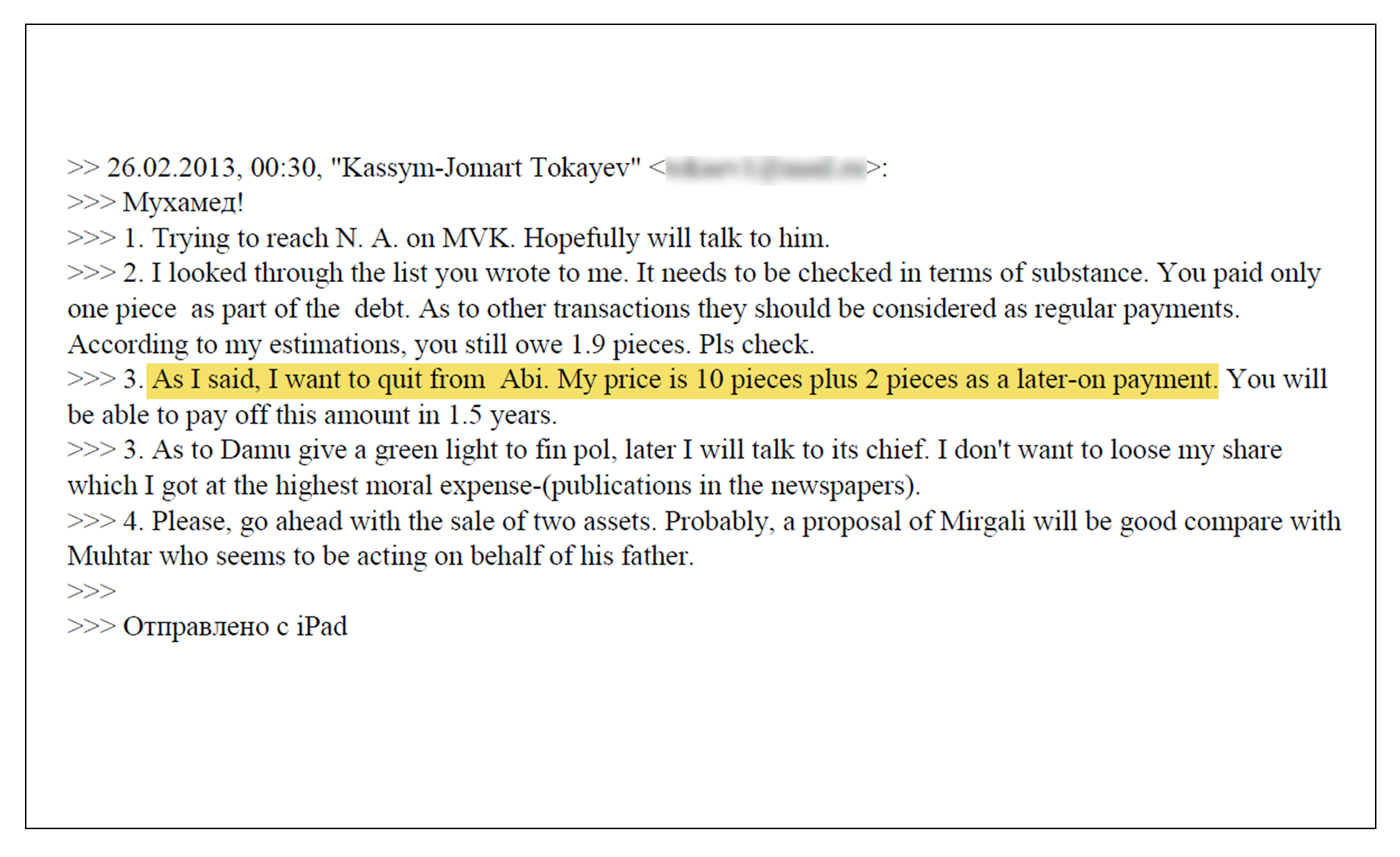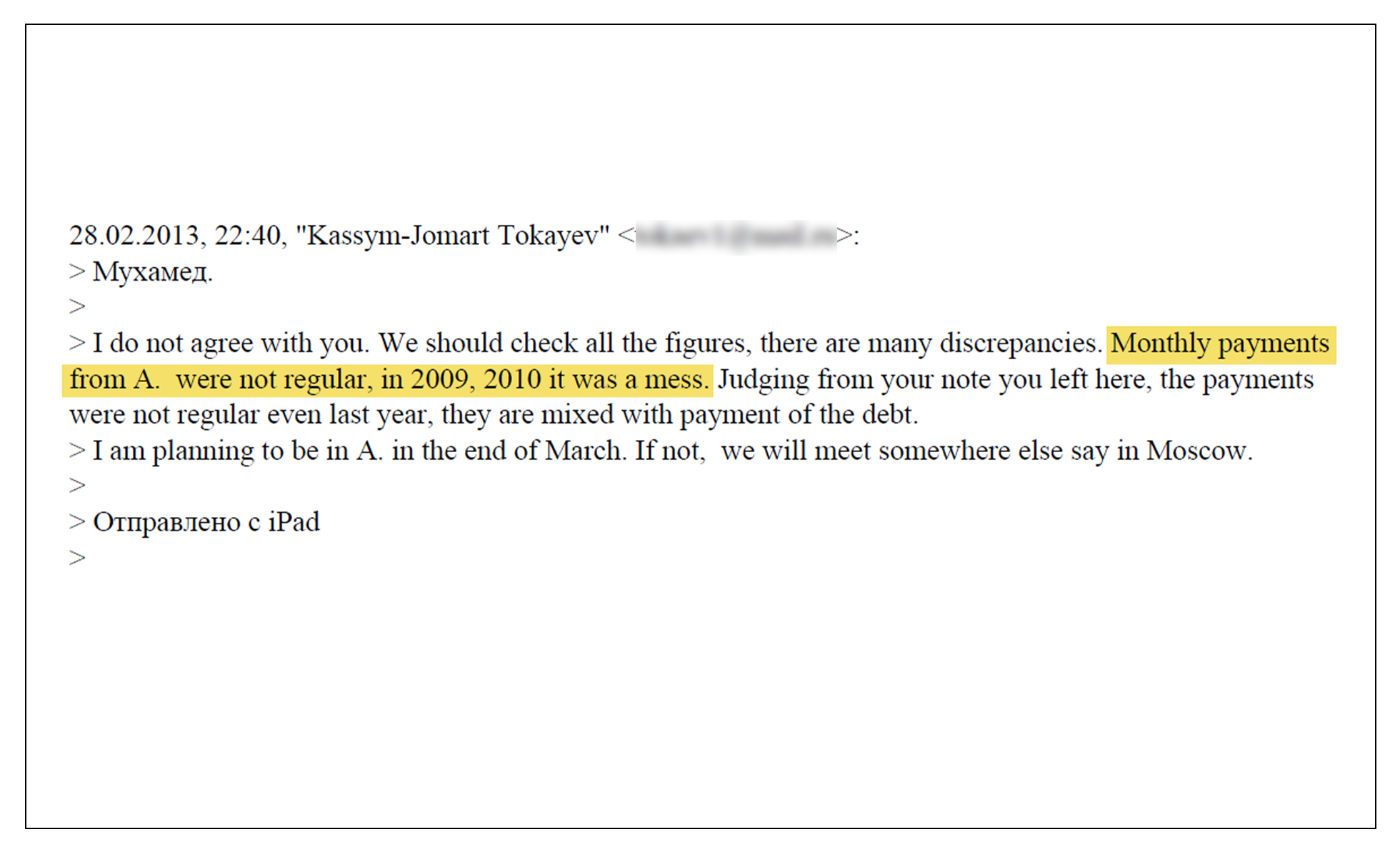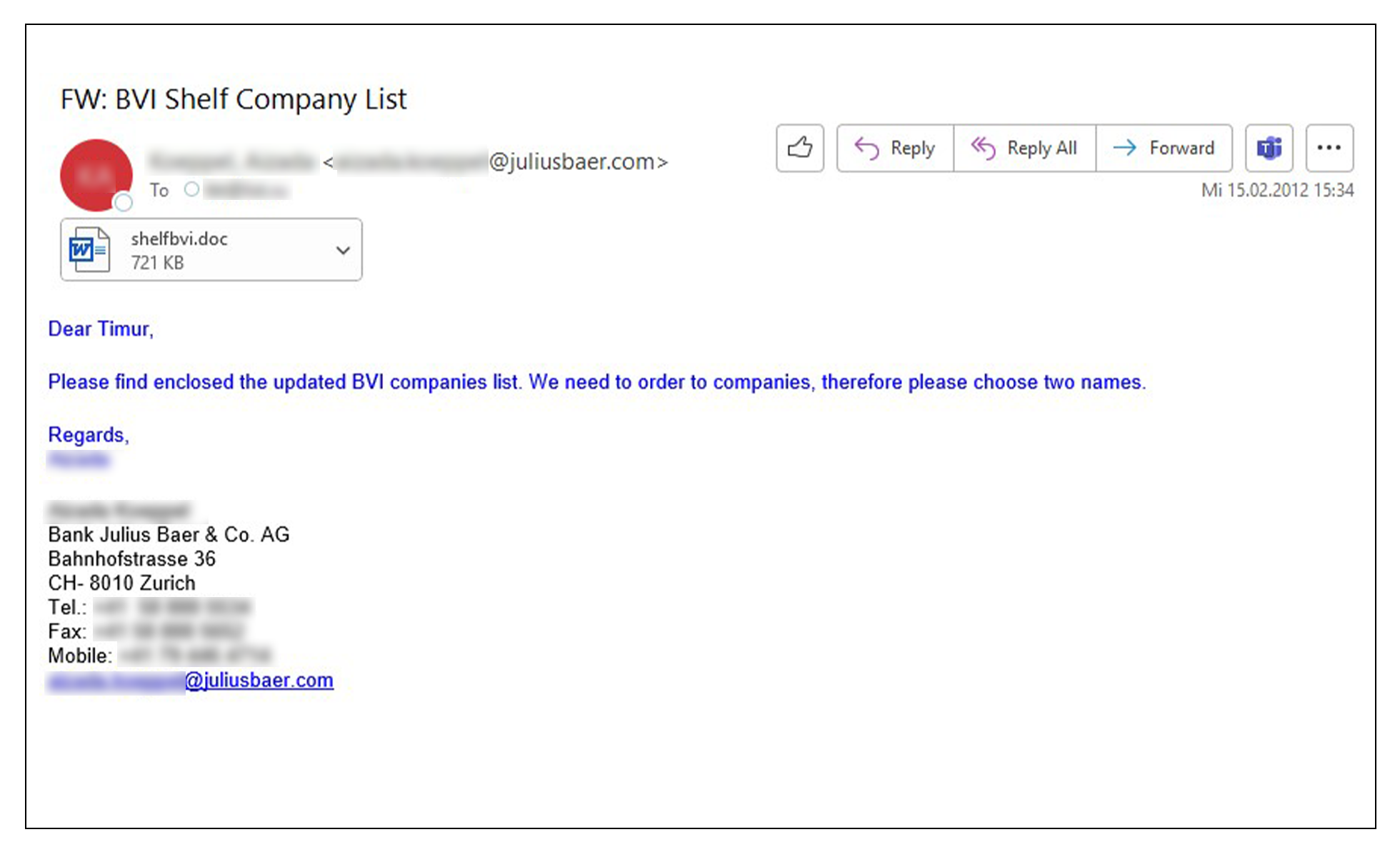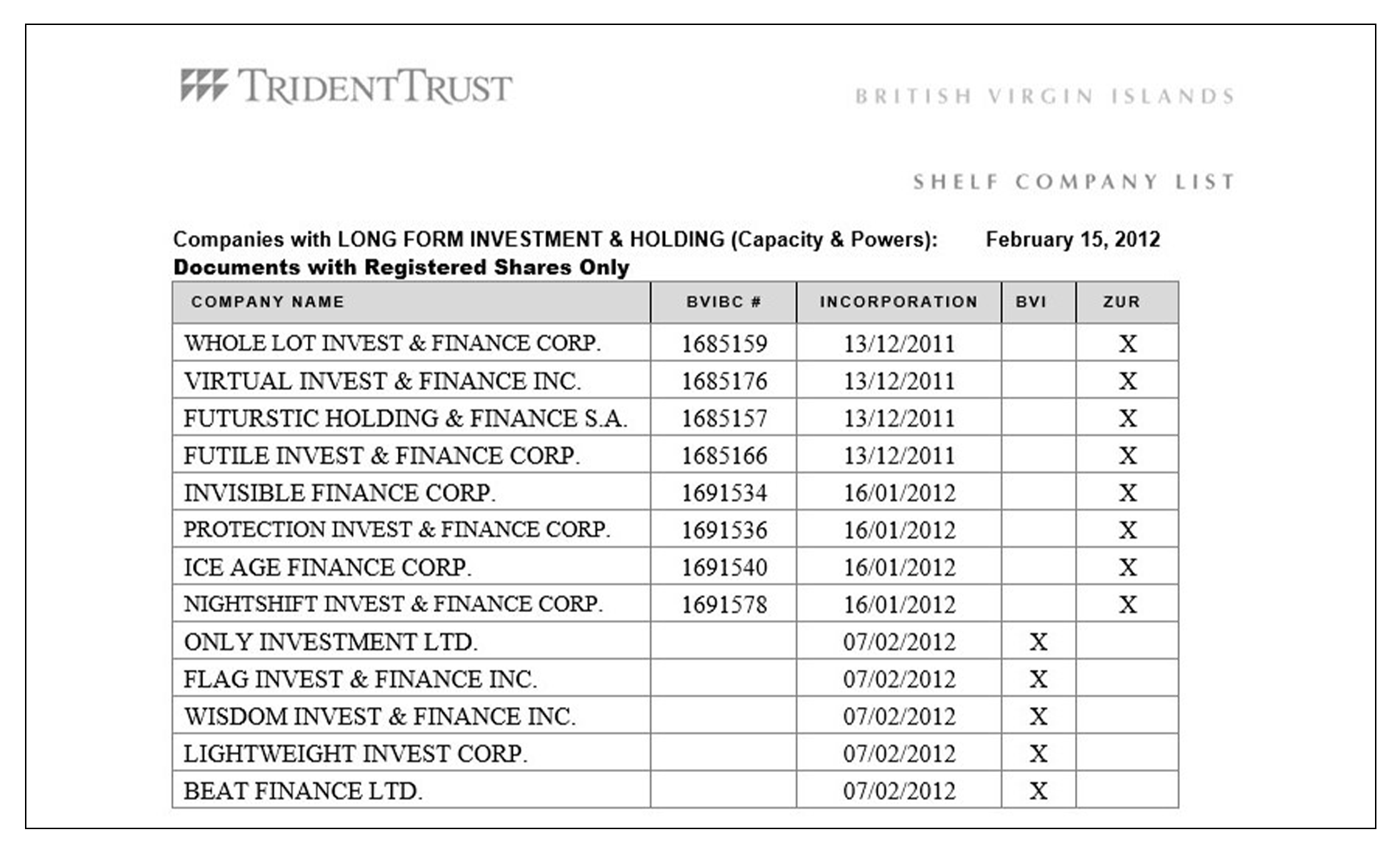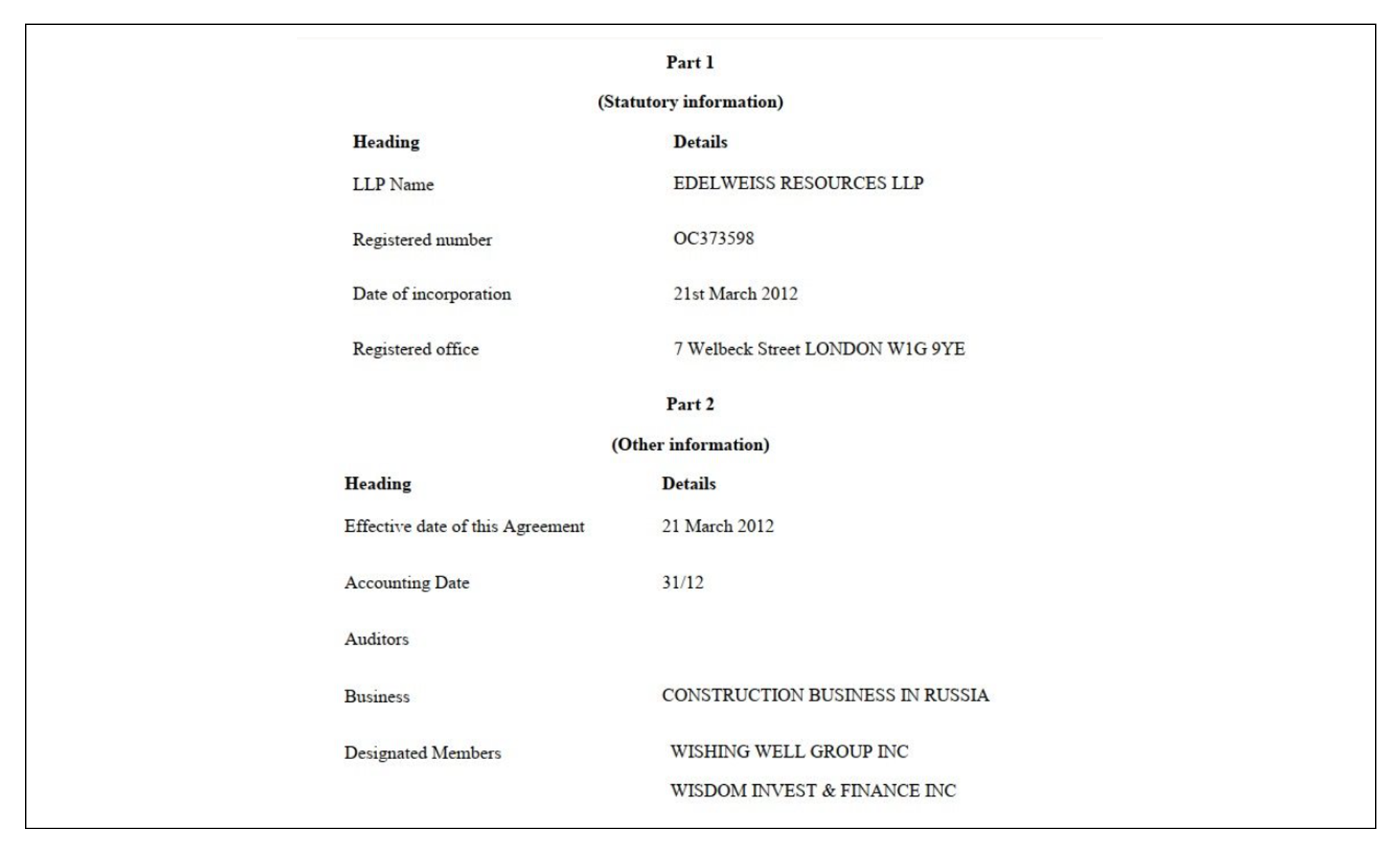Exclusive investigation The Kazakh president’s underground business passed through Switzerland
Agathe Duparc & Robert Bachmann, September 22, 2022
One side of the coin is an astute diplomat, Director General of the United Nations Office at Geneva (UNOG) from 2011 to 2013, described by his colleagues as a cultured individual who, in his spare time, writes books and publishes media articles vaunting the merits of multilateralism. On the other side, there is a man with an iron will, brought in as president by his predecessor Nursultan Nazarbayev in 2019. During the January 2022 riots in Almaty (the business capital of Kazakhstan), he gave the order for live rounds to be fired at demonstrators who were protesting against the increase in gas prices. According to official figures 232 people were killed.
 ©
Keystone/AP Photo/Vladimir Tretyakov
©
Keystone/AP Photo/Vladimir Tretyakov
A businessman in the shadows
This gulf between the two sides of the coin is no longer a secret. However, another dimension of Kassym-Jomart Tokayev has remained in the shadows to date – that of a seasoned businessman who hides behind close associates to secretly manage his oil and strategic metals assets and whose revenues have been deposited in numerous bank accounts in Switzerland. It is a rather surprising profile for this great servant of the state who spent his entire career in the public sector, acting first as Minister of Foreign Affairs, then as Prime Minister, President of the Upper Chamber (the Senate) and subsequently the Lower Chamber (Majilis) of the Kazakh parliament, before being elected President (see his biography below). This business could constitute a violation of Kazakh laws – those that prohibit senior public servants from engaging in commercial activities and holding more than 5% of shares in companies, and those that ban parliamentarians from engaging in commercial activities, also particularly from managing companies.
Nevertheless, the current Kazakh president presents himself as determined to put an end to the dubious practices of the Nazarbayev era. The day after the bloody Almaty riots, he stated “Thanks to the first president (Ed. Nazarbayev) we have seen the appearance of a group of very profitable companies and a group of very rich people, even by international standards, in our country. I think it’s time to reimburse the people of Kazakhstan”. To restore his virginity, he decided to call early presidential elections on 20 November 2022, which he described as a "radical reset of the entire political system".
More infos
-

Kassym-Jomart Tokayev, a great official serving the state
1994-1999: Minister of Foreign Affairs
1999-2003: Prime Minister
2003 and 2007: Minister of Foreign Affairs
2007 to 2011: President of the Senate
March 2011-October 2013: Director General of the UN Office at Geneva
2013 to March 2019: President of the Senate
20 March 2019: he is appointed interim president following the resignation of Nursultan Nazarbayev.
April 2019: elected president with 70.8% of the votes
We discovered what was going on behind the scenes after we received emails from the future president and his son Timur, which were hacked in 2014. Two of the hacked emails showing the close relations between the Tokayevs and the Nazarbayev family had already been published in 2016 in the Kazakh opposition paper Respublika, and three years later on the website Kazakhstan 2.0. At the time, the individuals concerned neither responded publicly nor denied the authenticity of the emails. Public Eye obtained access to thousands of emails, written in Russian and English between 2006 and 2014, with attachments. In order to ensure their veracity, we mandated a reputable Swiss computer expertise company. The latter analysed several files and concluded that they "found nothing suspicious that could indicate manipulation of the e-mails". These files also confirm, by deepening them, information already brought to light in investigations that had not had access to these leaks.
These emails open the door to the secrets of the Tokayev family – and make it possible to identify their contacts in Switzerland.
Lawyers, trustees and bankers, real estate agents and interior decorators – over ten professionals in Geneva, Zurich, Basel and Ticino have rolled out the red carpet, seemingly without asking too many questions. In the correspondence, it appears that the influential Kazakh family repatriated to Switzerland part of the profits they made in Kazakhstan; we were able to document a transfer to a bank account at Julius Bär in Zurich, held by an offshore company controlled by the Tokayevs.
The tradition of welcoming central Asian elites, particularly from Kazakhstan, is well established in Switzerland. The former president Nursultan Nazarbayev’s clan and other controversial figures from Kazakhstan have made themselves comfortable for several decades – and despite several scandals the practices in Switzerland have not changed.
- Read about this topic: "Swiss-Kazakhstan – a long and scandalous love story"
The game of two families
 ©
yyedilov / Telegram
©
yyedilov / Telegram
In the Tokayev family, Timur is the only son, born in 1984. He has been a Geneva resident for over two decades and has an interesting profile. When his father was elected president of Kazakhstan in April 2019 with 70.8% of the vote, several Kazakh and Russian media outlets took an interest in the naturalised Swiss (as we discovered) businessman’s dazzling career. In February 2022, the OCCRP, a consortium of investigative journalists that includes the online news outlet Vlast from Kazakhstan, revealed in the context of the international Suisse Secrets Investigation that he was only 14 years old when in 1998 a bank account at Credit Suisse was opened in his and his mother’s name, Nadezhda Tokayeva. The Kazakh family already appreciated the advantages offered by the lovely Switzerland.
The young man was educated at Collège du Léman, a swanky private school in Versoix, near Geneva. He then studied at the Webster University in Geneva before joining the prestigious academy of the Ministry of Foreign Affairs in Moscow. There, he wrote a dissertation on ‘the Republic of Kazakhstan’s strategy vis-à-vis the West’ in which the name of the autocratic president Nursultan Nazarbayev, at the time in power for 20 years, appears 112 times.
However, political sciences were not his only passion – in 2013 the Kazakh press revealed that, at the age of 18 in 2002, Timur Tokayev took on a 50% shareholding in a company called Abi Petroleum Capital. While his father was on the brink of concluding his tenure as Prime Minister to take up his appointment as Minister of Foreign Affairs, this small company obtained an exploration and subsequently an exploitation license for the Gradovoye oil field (blocks XXVI) situated near the city of Novobogatinskiy in the region of Atyrau, in western Kazakhstan. The other owner of Abi Petroleum Capital was Muhammed Izbastin, Timur’s cousin. He is the son of the diplomat Temirtay Izbastin, married to the sister of Kassym-Jomart Tokayev and currently serving as ambassador to Bulgaria.
“My price is 10 pieces”
That’s for the shareholders on paper. However, in the leaked emails we had access to, it appears that the future Kazakh president was also one of the beneficiaries of Abi Petroleum Capital. He primarily conveyed his concerns and advice on managing the asset to his nephew Muhammed Izbastin, who was based in Kazakhstan. On 30 December 2012, when he held the prestigious post of Director General of the United Nations Office at Geneva, Kassym-Jomart Tokayev seems to have been worrying about the future of this small petroleum company that, in that year, had made profits of KZT 890 million (Kazakh tenge, the equivalent to USD 5.8 million at the time). He writes:
“Muhammed! The environment for oil is in constant decline and the outlook is not good. What do you think about selling the asset? That would enable us to enter other, more promising sectors.”
A few weeks later, the diplomat says he needs money urgently. He explains that he is in contact with someone who can help sell, someone influential within the Nazarbayev clan. He writes “As I’ve already said, I want to leave Abi. My price is 10 pieces (Ed. USD 10 million) plus 2 (Ed. USD 2 million) for a late payment”, complaining that he received “irregular” monthly payments from the company in 2009 and 2010. He deplores a “shambolic” situation. His nephew responds that "10 million for 50% of the shares is too high", but that a potential buyer – whose identity is not revealed in the emails – could be interested.
Currently, Abi Petroleum Capital seems to have been put to bed. Its website has been disactivated. The application Wayback Machine nonetheless gives access to several screen shots, the last of which is dated July 2014. The documents we obtained do not reveal whether Kassym-Jomart Tokayev was able to get the millions he was hoping for.
Four suspicious transfers to Julius Bär
In any case, the small petroleum company provided the Tokayevs with non-negligeable revenues and, as we discovered, part of the profits generated in Kazakhstan found their way to Switzerland. In autumn 2012, Tokayev son opened an account at the private bank Julius Bär in Zurich. The account holder was an offshore company called Edelweiss Resources LLP. Bank statements show that between 11 October 2012 and 25 February 2013, Abi Petroleum Capital made four transfers totalling USD 1.76 million to the company, which was newly registered in London.
In the emails we went through, it appears that at the start of 2012, Timur Tokayev wrote to the Zurich branch of Trident Trust to set up an opaque offshore company. A virtuoso in providing these kinds of services, the fiduciary globally known for serving large fortunes – and whose name has been cited in numerous journalistic investigations – responded to the request. It registered Edelweiss Resources LLP in the UK as a company whose purpose are “construction activities in Russia”. The company itself is held by two other companies, registered shortly beforehand in the British Virgin Islands (BVI), namely Wisdom Invest & Finance Inc and Wishing Well Group Inc. Timur Tokayev is indeed the owner of Edelweiss Resources, but only the names of the two companies registered in the BVI appear in the British register. The International Consortium Of Investigative Journalists ICIJ’s great Suisse Secrets investigation already noted the existence of offshore entities used by the Tokayev family, without however getting to the bottom of the mystery.
But why did the Tokayevs set up Edelweiss Resources LLP and what is the connection to the family’s petroleum company?
Smells like an odd contract
In the leaked emails, we retrieved a contract that appears to have served to justify the arrival of the funds at Julius Bär in Zurich. Signed in 2012 between Edelweiss and Abi Petroleum – both companies, once again, controlled by Timur Tokayev, with the secret involvement of his father Kassym-Jomart in Abi Petroleum in the background – the document stipulated that Edelweiss would be paid to provide services to enable Abi Petroleum to unload its oil shipments at Primorsk port, the large Russian oil terminal situated on the Baltic Sea coast, approximately 100km from Saint Petersburg. More specifically, the small British company would undertake the storage and protection of Abi Petroleum’s merchandise and exchange with the port authorities. There are numerous questions concerning the true circumstances around the contract. First and foremost, there is no explanation as to why a British company officially involved in construction activities in Russia would be tasked with providing services of a completely different nature in a Russian oil port. The fact that the contract was signed between two companies owned by the same owners – one of which was set up shortly before the contract was signed – also raises suspicions.
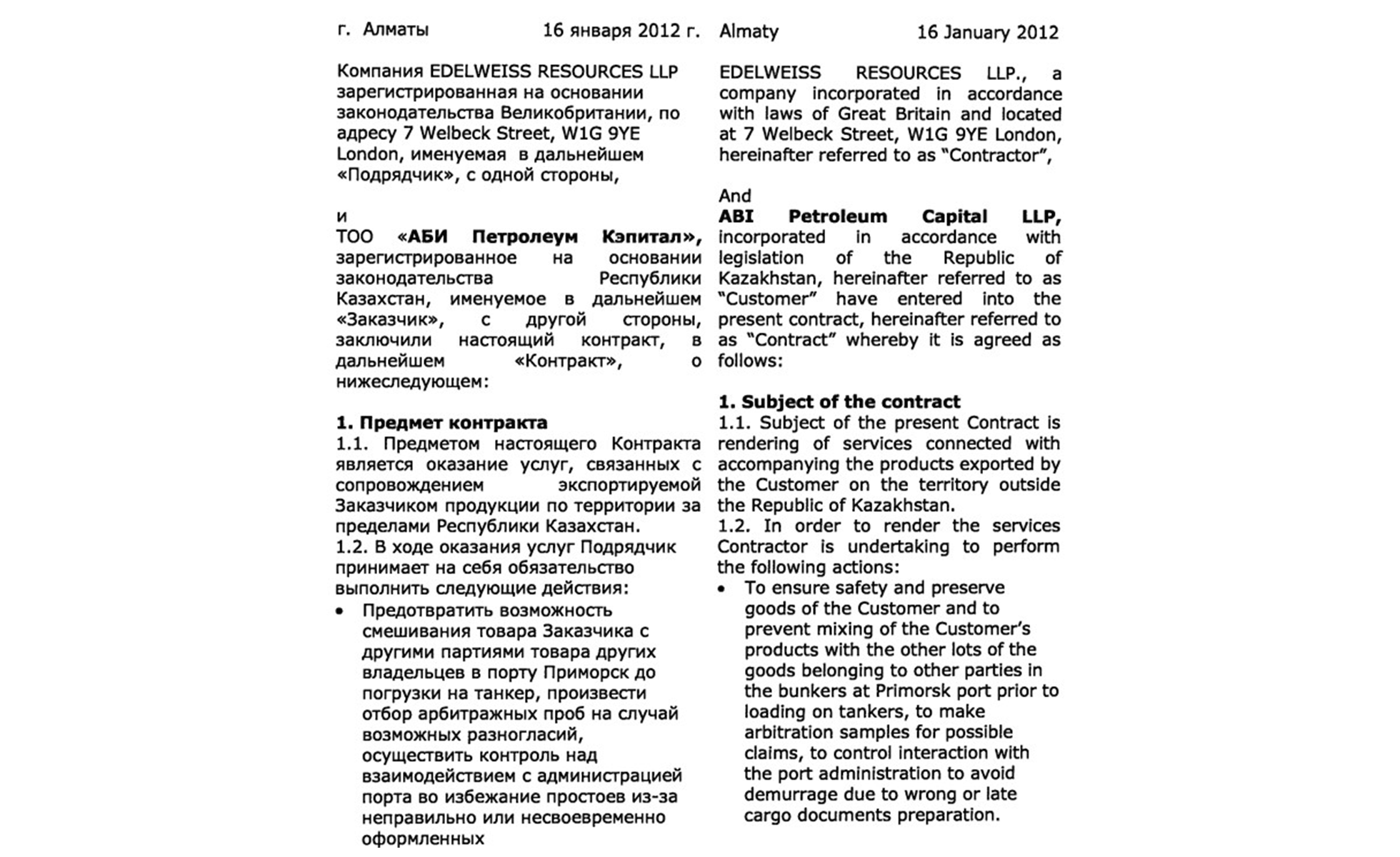
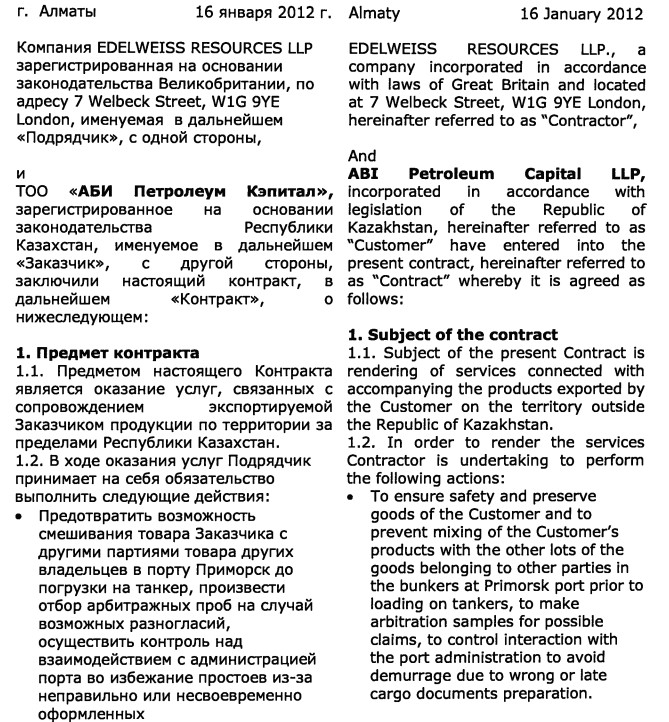
The documents we accessed show that Julius Bär supported and acted as a guarantor for this operation, in direct collaboration with Trident Trust. Exchanges of emails reveal that in July 2012, a banker at the Swiss establishment was invited to Moscow by Timur Tokayev - at the time the banker sent him the contract between Edelweiss and Abi Petroleum. This seems to have enabled the Tokayevs to keep their petroleum profits safe in Switzerland and to acquire new assets. According to the documents in our possession, a part of this money then served to facilitate the purchase of shares in Apple and Uranium One (a subsidiary of the Russian state’s nuclear giant Rosatom) as well as the acquisition of shares in an investment fund focused on uranium production.
In an email sent to his son on 24 February 2013, the future president of Kazakhstan mentions payments made by Abi Petrolum to Edelweiss in 2012, alongside other sums (in cash?) that he received that year via his nephew. The payments total over USD 4 million.
Red flags ignored
Did Julius Bär and Trident Trust know that the father was hiding behind the son? When contacted, Julius Bär responded that it could not “disclose information on real or presumed client relations”. The fiduciary responded that “the Trident Trust group does not discuss its clients with the media but systematically cooperates with all responsible authorities that request information”.
Numerous signs should have alerted the two establishments’ compliance services – firstly the fact that Kazakhstan is a high risk country for corruption (ranked 133rd of 176 countries on Transparency International’s Corruptions Perceptions Index in 2012); and the fact that it is known that the children of high-ranking public officials and members of parliament often hold significant wealth in bank accounts on behalf of their parents, due to the Kazakh law preventing the latter from engaging in business activities alongside their careers in service of the state.
Back in 2012, Swiss banks and financial intermediaries already had extended due diligence obligations in relation to Politically Exposed Persons (PEP) – a category that unquestionably includes Kassym-Jomart Tokayev and his son given the former’s state functions. The Swiss Financial Market Supervisory Authority (FINMA) ordinance on money laundering also required them to verify the identity of the beneficial owners of companies, to identify any Politically Exposed Persons and to clarify the economic background to all transactions, in particular those that appear unusual – like those of the transfers from Abi Petroleum to Edelweiss Resources.
Swiss bankers’ belly dancing
However, instead of becoming the subject of increased scrutiny, on its journey the Kazakh family encountered amenable facilitators whose motto seemed to be ‘Let’s ask as few questions as possible’. At the end of 2009, Timur, who was only 25 years old, was courted by various bankers. One of them was employed by KBL (Switzerland) Ltd, a small bank then located at Boulevard George-Favon in Geneva. The young Kazakh transferred the share portfolio previously lodged at Credit Suisse under his mother’s name, Nadezhda Tokayeva, to this discreet establishment that would be bought in 2015 by BIL, the Banque Internationale à Luxembourg (Switzerland) SA. The operation was completed in early 2010, despite several anomalies – in numerous exchanges a Credit Suisse banker reminded Timur that they were still awaiting instructions from ‘“Nadezhda” to close the account, accepting nonetheless to transfer the shares to KBL without waiting for her agreement. A bank document shows that at the time the portfolio was worth USD 507,647, comprised of investments in oil (nearly 40%), mines and steel (46%).
Numerous email exchanges show that the KBL banker, who went on to continue his career within another bank at Geneva and to maintain excellent relations with the Tokayevs, bent over backwards to attract these funds.
When contacted for comment, Credit Suisse stated that it “does not comment on potential client relationships” but said that it “operates its business in compliance with laws and regulations in all markets in which it operates including with regard to Politically Exposed Persons” and takes actions in line with applicable policies and regulatory requirements when it finds “signs of misuse of an account for illicit activities”. BIL says it is not in a position to answer our questions, taking refuge behind banking secrecy.
 ©
Keystone/EPA Photo/Anatoly Ustinenko
©
Keystone/EPA Photo/Anatoly Ustinenko
Stake in a mining group and a mysterious payment to Geneva
The Kazakh family was not only a keen player in the mining market. Tokayev father and son as well as their nephew Muhammed Izbastin were also beneficial owners of the Kazakhstan Tungsten & Molybdenum Company (KTMC). This is shown by numerous emails and attachments. The mining group was registered in 2007. It included two companies that held exploitation licenses for the Karaoba and North Kaptar tungsten and molybdenum deposits in the Karaganda region in central Kazakhstan, as well as a hydro-metallurgic factory at Stepnogorsk that processed the ores, which have numerous industrial applications.
An email written by Muhammed to his uncle Kassym-Jomart Tokayev (then president of the Kazakh Senate) shows that in summer 2009, the family trio owned 50% of KTMC’s shares, but had only paid USD 6.5 million on the agreed sales price of USD 30 million. The sellers, three Kazakh businessmen, had accepted that the new arrivals would only pay their full due once their share had been resold.
KTMC was going through some turbulence at the time. Following the theft of potentially hazardous materials from its hydro-metallurgic factory in Stepnogorsk in summer 2007, a criminal procedure had been launched, paralysing its activities for several months and forcing it to put its workers on technical unemployment.
Kassym-Jomart Tokayev was called in to help in his capacity as President of the Senate. On 1 November 2007, the community of the hydro-metallurgical factory had sent him a letter asking him to intervene and engage the judicial authorities to unblock the situation. Did the high-ranking official do so? Was it following this episode that he decided to take a stake in KTMC? We don’t know.
There are still other things that remain in the dark – like the USD 694,000 that KTMC transferred in November 2008 to the account at UBS Geneva from an offshore company called Clintex Enterprices Inc (BVI). According to our information, at the time this shell company belonged to close associates of the Tokayev family. It was involved in the wheat trade, which leaves unclear what links it could have with the mining company and why this payment was made in Switzerland.
“It would be good for you to come to Geneva”
In any event, Kassym-Jomart Tokayev’s secret shares in KTMC swiftly started to be a source of hassle. At the end of 2009, the family sought to bring a Chinese company in as a shareholder, but the deal fell through. Numerous exchanges appear to indicate that from 2011 onwards president Nursultan Nazarbayev personally monitored the affair. There were many eager potential foreign investors around the Tokayev family and at one point there was a possibility that the state nuclear company Kazatomprom would purchase the shares. Two years later, nothing had been resolved. In February 2013, Kassym-Jomart wrote “Muhammed! What’s the status of the KTMC negotiations? Give me a detailed answer. I still think we need to sell to people with money, like the Japanese. I recently spoke to the Boss (Ed. President Nazarbayev’s nickname). He wants to know where we’re at with the business and he advised me not to delay the sale. He mentioned the Germans as potential buyers. It would be good for you to come to Geneva to discuss this in person.” Muhammed responded: “I’ll be there at the end of the week”.
In the background, the negotiations appear to have been intense. Even the then Prime minister got involved. In the emails, we understand that in spring 2013, Nazarbayev made a decision. Fearing that the Tokayevs’ shares, which were viewed as ‘strategic’, would fall into the hands of the Chinese, he designated Samruk-Kazyna, the Kazakh sovereign state fund, as the only buyer.
In June 2015, Samruk-Kazyna’s mining branch made an announcement of a few lines that it had acquired 100% of the shares of the North Katpar company, which owned the license for the eponymous deposit, for KZT 7.7 billion (Kazakh tenge, equivalent to USD 41.7 million at the time). It was a real jackpot, all the more so because it is only one of the three assets of KTMC. According to an article in the Kazakh press, this significant tungsten deposit was still undeveloped at that point; it had barely been exploited.
Where these funds went remains a mystery. Our long list of questions to Kassym-Jomart Tokayev, both about Abi Petroleum and KTMC, has not been answered. His nephew Muhammad Izbastin could not be contacted.
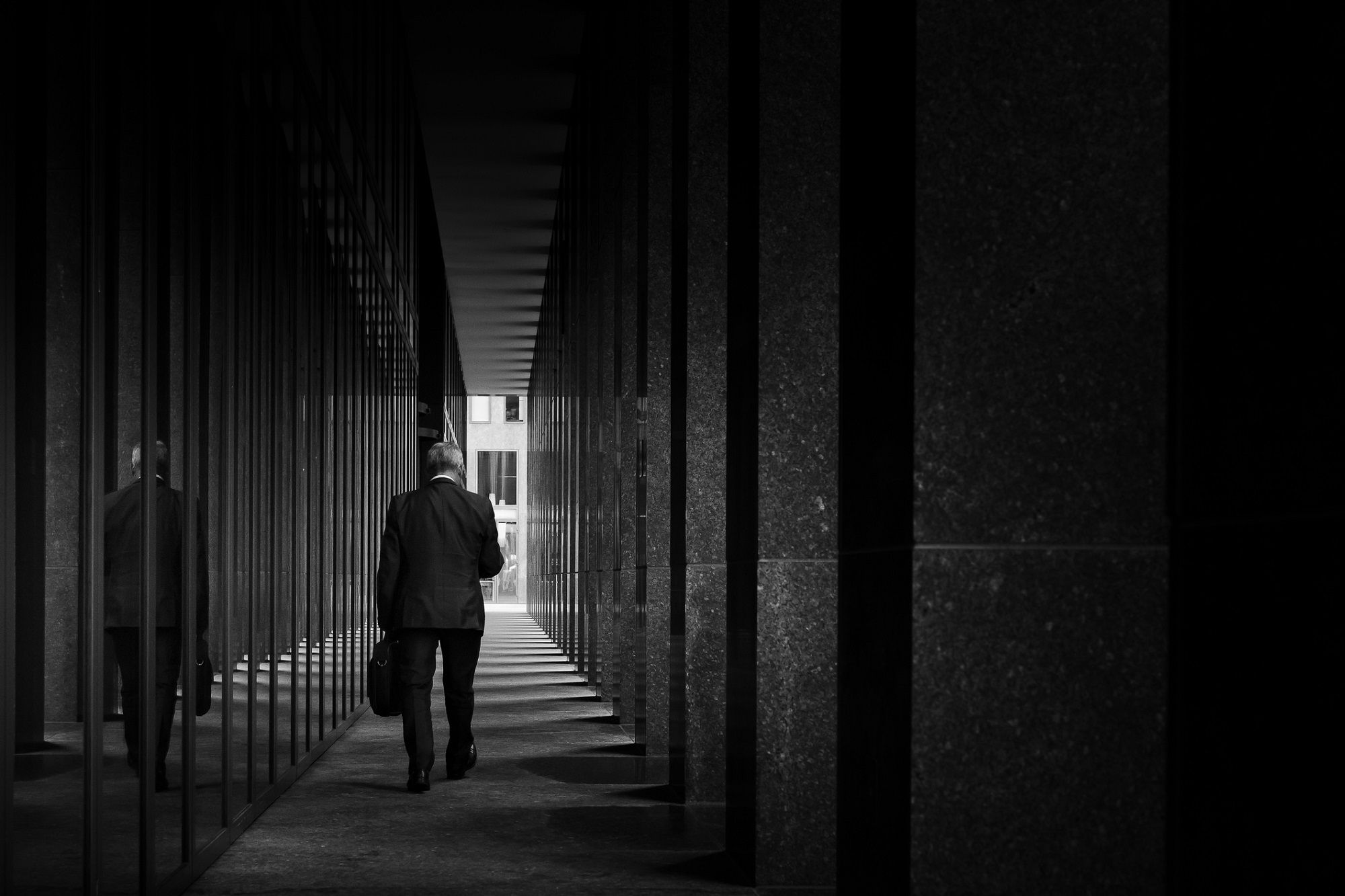 ©
Getty Images
©
Getty Images
The family’s Swiss Army knife
As we have seen, the Tokayevs felt at home on the shores of Lake Geneva. They could in particular count on the loyal services of T.U., a commercial lawyer known in Geneva, who was also director of a fiduciary. The emails we were able to consult show that the specialist in fiscal arrangements, who defended Mossack Fonseca when the scandal of the Panama Papers broke, was a man of many talents. He managed Timur Tokayev’sexpenditure budget, arranged for electricians to come and reminded him to pay his invoices. After helping to register the company Edelweiss Resources LLP in London, which seems to have enabled the Tokayevs to take money out of Kazakhstan under opaque circumstances (see above), he was asked by Timur to set up a company under the same name in Switzerland. He responded “You are not the first to have this idea. There are many companies called EDELWEISS and also an EDELWEISS AG. We can either put EDELWEISS trade mark management AG (or something along those lines) or we have to change the name. What do you want to do?” Tokayev junior showed great imagination and suggested ‘Edelweiss Foresight Management’. In the Swiss company register we did not find any trace of a company registered during this period named after the delicate alpine flower. This gives the impression that another solution was chosen. In any case, lawyer was also aware of the existence of the small company Abi Petroleum, as evidenced by an email dated 2008.
T.U. also managed real estate assets and relations with banks. In summer 2010, he supervised Timur’s purchase of a duplex penthouse of 307m2 in a luxury residential complex close to Geneva, with a view over the lake. It cost CHF 3.47 million. For the purchase, the lawyer helped his client take out a mortgage at Wegelin & Co bank at Zurich, where one year previously Timur opened an account on behalf of a Canadian shell company – INVESTISSEMENT L’ARC EN CIEL S.A. –which T.U.’s fiduciary had set up previously. Wegelin, the oldest private bank in Switzerland, had been pampered by the Tokayevs for a long time. From 2000 to 2007, when her husband was Prime minister and subsequently Minister of foreign affairs, Nadezhda Tokayeva had an account there. This is evidenced by a ‘confirmation letter’ signed by two managers at the establishment. Wegelin & Co, which in its lifetime welcomed the fortunes of many ex-USSR officials, was obliged to close its door in January 2013 after pleading guilty to fiscal fraud in the United States. The Tokayevs then turned to the private bank Notenstein.
From Tokayev to Kemell – magic tricks with the land registry
Was the Geneva penthouse a place to stay for Tokayev senior, who took up his post as Director General at the United Nations Office at Geneva a few months later? In any case, an email suggests that the future president of Kazakhstan stayed there in winter 2013.
Identifying the Tokayev family’s real estate assets in Switzerland on the basis of the land register is like a wild goose chase. In the canton of Geneva, Timur appears as the owner of the penthouse, but under another surname – that of Kemell. Without a doubt in honour of his paternal grandfather Kemel Tokaev, a writer well known in his country for his adventure and crime novels. At the end of 2019, numerous Kazakh media outlets had reported this change of name.

The same magic tricks was used for an apartment at Grand-Saconnex, in the outskirts of Geneva, purchased a few years earlier. The asset has been held under the name Yeldana Kemell née Chalabayeva since May 2022, as a result of a gift given by Timur to his wife. The questions sent to Timur Tokayev/Kemell were not answered.
The ease with which these properties were purchased by Timur Tokayev and the opacity that prevails in the land registry once again show the glaring loopholes in the real estate sector in Switzerland. In May 2013, the Federal Police (fedpol) published a report concluding that the market was “generally attractive to money launderers”. The real estate agents, notaries and lawyers who arrange sales are not yet subject to the federal Anti-Money Laundering Act (AMLA).
The Financial Action Task Force (FATF), which sets the global minimum standards for combating money laundering, has been calling Switzerland to action for numerous years, to no avail.
Epilogue: Nepotism and family tapestries at the UN Office at Geneva
Just like all the powerful of this world, Kassym-Jomart Tokayev wanted to leave a legacy of his prestigious time in the post of Director General of the United Nations Office in Geneva. He registered a charitable foundation with public utility status, with himself and his son Timur as the Chairs. The Geneva lawyer T.U. directed the initiative. After many exchanges were had, proxies were sent and tax administration was discussed, the Foundation for Innovative Diplomacy was set up in May 2013. Its aim was to “promote diplomacy, considered as a science and practice of political relations between states to promote peaceful relations between nations”. In parallel, the family was also working on another initiative that had nothing to do with ‘innovative diplomacy’, but which Kassym-Jomart Tokayev was also proud of – the refurbishment of the XIV conference room at the Palais des Nations (the UN headquarters) in Geneva.
As we discovered, this renovation was generously funded by the Kazakh state for the modest sum of USD 842,357 and supervised from start to finish by Tokayev junior. Timur was in contact with an interior designer, who at the time was employed by Mabetex, a construction company based in Ticino that maintains close links to the Kazakh elite. Its name appeared in a momentous corruption scandal in Russia in the mid-1990s. The mandate was to completely revive what would become the ‘Kazakh Room’.
In October 2012, the architect signed a contract with the Kazakh UN mission and received USD 850,000 in their account at Swiss Migros bank. Of this budget, USD 384,117 was destined to pay a woman by the name of Batima Zaurbekova to produce and transport to Switzerland four large tapestries in honour of the glory of Kazakhstan. It turns out that Ms Zaurbekova, a master upholsterer whose work is highly regarded within the Kazakh establishment, is no other than Timur Tokayev’s mother-in-law, his wife Yeldana’s mother.
 ©
UN Photo / Violaine Martin
©
UN Photo / Violaine Martin
Was the eyewatering price of the mural tapestries (USD 384,117 in total or 96,000 each) justified? According to our information, in 2008 Ms Zaurbekova had sold identical works for less than USD 2,000 in Kazakhstan, albeit without transport costs. We were able to document an initial advance from the Migros bank totalling USD 192,000, which was transferred to the mother-in-law’s bank account on 24 December 2012. The rest was due to be paid upon delivery of the tapestries in May 2013.
When asked for comment, the Kazakh mission to the UN simply confirmed that the “handcrafted tapestries […] of high quality” that adorn the ‘Kazakh Room’ were made by Batima Zaurbekova who is a “member of the Kazakhstan Artists Union since 1974” and who holds the honorary title of “Honored Artist of Kazakhstan”. The mission points at the web site of the artist, which was apparently created only very recently. Our questions on the family links between Zaurbekova and the Tokayev family were not answered. Batima Zaurbekova could not be contacted, the mail address on her brand new website does not work. When contacted, the United Nations Office at Geneva explained that “work to renovate the Kazakh Room was undertaken by UNOG, but the project design and all art works were the sole responsibility of the donor country and were fully managed by the authorised officials, after UNOG had verified compliance with UN rules”.
The affair went smoothly in any case. Just before saying their goodbyes at Geneva international, in autumn 2013, Kassym-Jomart Tokayev inaugurated the premises with great pomp and ceremony. Two years later, while at the head of the Kazakh Senate, he managed to get President Nazarbayev to visit to admire his family tapestries during a private trip to Switzerland.


